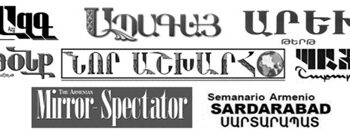WASHINGTON (RFE/RL) — US Secretary of State Antony Blinken phoned Azerbaijani President Ilham Aliyev on Monday, January 23, to call for an immediate end to Azerbaijan’s six-week blockade of the sole road connecting Nagorno-Karabakh to Armenia and the outside world.
“I urged President Aliyev to immediately restore commercial traffic on the Lachin corridor,” Blinken tweeted after the call.
“Each day it remains blocked risks a humanitarian crisis and undermines the steps that Armenia and Azerbaijan have taken towards peace,” he said. “The US is committed to supporting these efforts.”
A separate statement released by the US State Department said Blinken also “encouraged President Aliyev to redouble efforts in bilateral peace discussions with Armenia.”
Blinken spoke with Armenian Prime Minister Nikol Pashinyan by phone on January 18. He was reported to express “deep concern for the worsening humanitarian situation in Nagorno-Karabakh.”
The United States has repeatedly called for the lifting of the blockade. Azerbaijan has also faced similar calls by the European Union and Russia. Russian Foreign Minister Sergei Lavrov raised the issue with his Azerbaijani counterpart Jeyhun Bayramov in a January 17 phone call.
Baku has dismissed these appeals, saying that Azerbaijani government-backed activists who blocked the vital road on December 12 have the right to protest against “illegal” mining operations in Karabakh.
Armenia maintains that the blockade constitutes a gross violation of the Russian-brokered agreement that stopped the 2020 war in Karabakh. The agreement placed the Lachin corridor under the control of Russian peacekeepers and committed Baku to ensuring safe passage through it.
The authorities in Stepanakert reported at the weekend that Azerbaijan again blocked a pipeline that supplies natural gas from Armenia to Karabakh.
Armenia’s supplies of electricity to Karabakh were similarly blocked by Baku on January 10, leading to daily power cuts in the Armenian-populated territory. The energy crisis compounded shortages of food, medicine and other essential items endured by local residents.
In an interview with the BBC published by his office on Monday, the Karabakh premier, Ruben Vardanyan, insisted that despite the severe hardship the Karabakh Armenians remain “very firm in our desire to live in our homeland.”
EU Parliament Also Urges End to Blockade
The European Parliament on Thursday, January 19, urged Azerbaijan to “immediately reopen” the Lachin corridor, saying the continuing blockade of the sole road connecting Nagorno-Karabakh to Armenia violates a Russian-brokered ceasefire that stopped the 2020 war.
A resolution adopted by the parliament deplores the “tragic humanitarian consequences of the blockade” which it says were aggravated by “Azerbaijan’s disruption of the natural gas supply to Nagorno-Karabakh.”
The resolution also condemns the “inaction” of Russian peacekeeping forces in Karabakh that are supposed to control the Lachin corridor. It says that “their replacement with [Organization for Security and Cooperation in Europe] OSCE international peacekeepers, under a UN mandate, should be negotiated urgently.”
The European Union’s legislature added that the EU should do more to “ensure that the inhabitants of Nagorno-Karabakh are no longer held hostage by Baku’s activism, Russia’s destructive role and the Minsk Group’s inactivity.”
The EU as well as the United States and Russia have repeatedly called for the reopening of Karabakh’s land link with Armenia since it was blocked by Azerbaijani government-backed protesters on December 12. Azerbaijan has dismissed such calls, saying that the protesters have the right to demand that Baku be allowed to inspect “illegal” mining in Karabakh.
The 2020 truce accord placed the corridor under the control of Russian peacekeeping forces and committed Azerbaijan to guarantee safe passage through it, a fact emphasized by the European Parliament.
Meanwhile, the Karabakh premier, Ruben Vardanyan, criticized the EU’s recent oil and gas deals with Azerbaijan, saying that the 27-nation bloc thus “accepts the authoritarian regime” in Baku. In an interview with the France 24 TV channel cited by his office, Vardanyan said the EU should instead pressure Baku to lift the blockade.
The Armenian Mirror-Spectator






